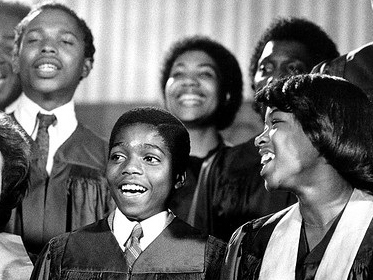Practicing Church Leadership
The Value of Honing Leadership Skills
 One afternoon at Redeemer, we hosted the choir from the public school across the street. The sanctuary was filled, people were standing in the aisles and down the steps. I found a seat in the choir loft behind the choir. It didn’t hurt the sound one bit.
One afternoon at Redeemer, we hosted the choir from the public school across the street. The sanctuary was filled, people were standing in the aisles and down the steps. I found a seat in the choir loft behind the choir. It didn’t hurt the sound one bit.
They started an anthem that featured a soloist. She had a hand-held microphone, hardly necessary in the small sanctuary, but it gave her confidence. She was singing with every ounce of her heart and the solo was reaching its climax, building phrase by phrase.
All I could see was the back of the choir. The middle school girls in the back row had a tacit communication going. They were anticipating the soloist’s coming high note. Each of them literally had their fingers crossed, their wrists punctuating every beat as they waited for what they hoped was coming.
And when that singer hit that note, you could feel them rejoicing within the decorum of the choir. But even if they jumped for joy, it wouldn’t have been out of line. The congregation was on its feet applauding in the middle of the anthem.
And so the congregation returns to routine. It’s Wednesday evening. For the last six decades Wednesday evening has been filled with church choir practice.
Every week the choir meets to make sure their Sunday music is as fine as they can make it. Every week the choir pools all its talent and raises voices to God. Even with all that practice, none of the members sitting in the pew expect them to be perfect. They won’t always hit that high note. But they’ll be back working on it next Wednesday night.
What about other skills of church leadership? Where’s the time for practice, honing skills, attempting something a bit beyond the usual, growing together, cheering for one another when a tough job goes great, laughing together when efforts bomb.
Maybe we need to hold Monday—evangelism practice, Tuesday—teaching practice, (Wednesday’s taken!), Thursday—prayer practice, Friday—stewardship practice, Saturday—social ministry practice.
It might be worth considering making these other skills as much a discipline as we expect from our musicians. Practice may not make perfect, but it builds confidence and it opens doors for new ideas. Skill sets grow.
Let’s practice mission. Try some new things. Be intentional enough to work at them weekly. Cheer when we succeed. Back to the drawing board when we don’t. We will experience both failure and success. Failure feeds success. But not if we don’t practice!
photo credit: Shavar Ross via photopin cc
